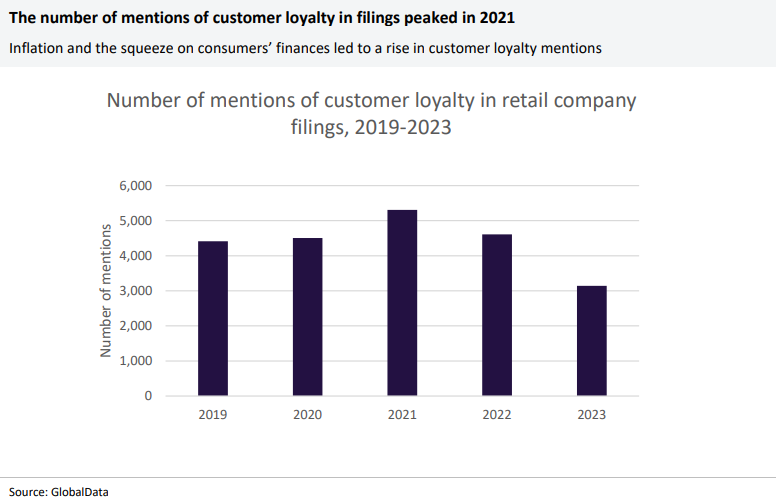
The State of Loyalty report, based on spending data from over 22 million UK bank accounts and a survey of 2,000 UK adults, sheds light on shifting consumer behaviour in the retail sector.
According to the report, 64% of respondents cited affordability as the most important factor when deciding where to shop, indicating the ongoing impact of inflation on consumers’ disposable income, despite some easing of the cost-of-living crisis.
However, brand loyalty isn’t dead. The study found that 59% of UK adults claim to have been loyal to certain brands for “as long as they can remember.” Additionally, 69% of respondents consider trust in a brand important when making a purchase decision.
GlobalData apparel company filing mentions of brand loyalty between 2016 and 2024

Source: GlobalData
The number of mentions of brand loyalty in filings gradually increased between 2020 and 2022, before it reached a peak of 73 mentions.
GlobalData’s Company filings analytics on “Customer Loyalty in Retail and Apparel,” indicated that mentions of customer loyalty gradually increased between 2019 and 2021 in the UK, when it reached a peak of 5,305.
COVID-19 and the resulting lockdowns placed greater importance on customer loyalty, and then in 2022 rising inflation caused more consumers to cut back their spending and be more selective about their purchases.
As a result, more retailers prioritised customer loyalty to retain shoppers and prevent them from switching to discounters, causing high mentions. However, mentions fell back in 2022 and again in 2023, with the drop in 2023 potentially signalling a reduced focus as many customer loyalty-related initiatives had already been started.

The Cardlytics report suggests that loyalty programmes play a significant role in consumer behaviour after three in five (61%) respondents said they are more likely to visit a store if it offers a loyalty or rewards system. This figure rose to 70% among the 18-34 age group, indicating that younger consumers are particularly receptive to such incentives.
Lucy Whittemore, senior vice president of UK Advertising at Cardlytics, commented on the findings: “Whilst affordability will always be key for consumers, particularly in tough economic times for consumers and households, building brand loyalty is key.”
She emphasised the importance of data-driven strategies, stating: “By gleaning insights from customers’ spending data, brands can create tailored, relevant offers for consumers – both new and existing.”



